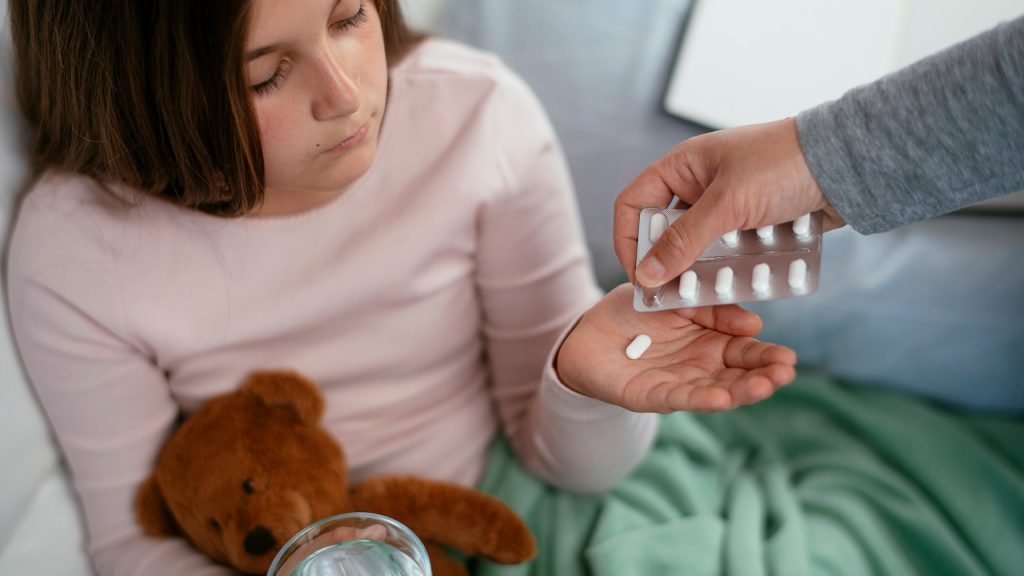This article was originally featured on Undark.
Mark Turner, who has been working in pediatrics for over 30 years, is exhausted from telling parents that there’s little he can do for their children. He mentioned that very few medicines are created with young people in mind. He finds it very difficult to watch them be ill and see babies die.
Turner is talking about the limited research on how different medications work in children. When drugs are approved, it’s mainly based on how they work in adults. This applies to nearly all conditions, including mental health issues, cancer, and rare diseases.
As a result, children are often given medication “off-label,” which means the drug is used in a way that’s not specifically outlined on the package insert. Most drugs given to newborns are used off-label, as well as about half of those prescribed for older children, according to Vivianna Guzman, executive director of I-ACT for Children, a nonprofit working to enhance children’s access to drugs.
This can present a tough choice for physicians and parents. Although most off-label drugs for kids seem safe, the lack of proper testing means children face a relatively higher risk of side effects than adults, as experts told Undark. side effects than adults, experts told Undark. Also, medications that work well in adults might not be as effective in young people. Additionally, in urgent situations when medication is needed, physicians and parents may find they have no access to clinical trials, which historically excluded children. As experts mentioned, the reasons for this are both practical and financial.
The American Academy of Pediatrics has stated that off-label prescribing does not necessarily entail great risk. It simply means that the medication has not met FDA guidelines, which require studies to be conducted in the specific population that will use the drug: in this case, children. stressed In the absence of such evidence, medical groups develop dosing guidelines based on expert consensus. This consensus may be founded on a combination of clinical expertise and systematic reviews of the literature, as well as input from regulators or organizations like the World Health Organization. Turner, who is involved in a European effort to support pediatric clinical trials, explained that it’s not guesswork like tossing a coin, but it’s less than ideal when kids’ medications don’t meet the same standard expected for adults.
Mark Turner has been working in pediatrics for over 30 years and he's tired of telling parents that there's nothing he can do for their kids. He mentioned that only a few medicines are made for young people. It's difficult for him to watch them be ill and see babies die. European effort to support pediatric clinical trials. However, he added that it’s less than ideal when medications for kids don’t meet the same standard expected for adults.
Medicines were developed on an ad-hoc basis until the 1960s, when the Thalidomide scandal led to the reform of the U.S. Food and Drug Administration’s drug approval process. For decades, regulators and medical ethicists argued that children should be excluded from these trials because they are a vulnerable population, seen as at risk of exploitation by researchers. Thalidomide scandal led to the reform of the U.S. Food and Drug Administration’s drug approval process. The agency began requiring drugs and medical devices to be tested for specific conditions in clinical trials before they could be widely prescribed. For decades, regulators and medical ethicists argued that children should be excluded from these trials because they are a vulnerable population, seen as at risk of exploitation by researchers. vulnerable population, considered to be at risk of exploitation by researchers.
These days, researchers agree that it’s appropriate to conduct research that is safe for children, who have a lot to gain from participating in clinical trials. However, change has been slow. “For the most part, drugs are never developed for kids,” said Florence Bourgeois, an associate professor of pediatrics at Harvard Medical School.
A 10-year study A study of 1.74 billion visits to the doctor for children found that about 40 percent of them resulted in a prescription for a medication that is not officially approved for use in children. Antihistamines were the most commonly prescribed off-label medication, followed by antibiotics and antidepressants. Daniel Horton, an associate professor of pediatrics and epidemiology at Rutgers and one of the study's authors, mentioned that there is less evidence supporting the benefits of antidepressants in children compared to adults.
For decades, regulators and medical ethicists argued that children should be excluded from clinical trials because they are a vulnerable population, considered to be at risk of exploitation by researchers.
Most of the antidepressants that kids receive, such as Trazodone, Citalopram, and Bupropion (sold as Wellbutrin), have not been approved to treat depression or any other condition in kids. Daniel Horton, who is not a psychiatrist, pointed out that potential side effects include suicidal behavior and possible heart problems. He also noted that some of the risks are known to prescribers, but others are not well-known.
Sertraline, also known as Zoloft, is often prescribed to children and teenagers with depression, even though it has only been approved to treat OCD in young people. approved Studies showed modest benefits in young people with depression, Horton wrote in an email. However, the study also revealed many side effects, and it did not lead to regulatory approval. one study A paper by Horton suggested that off-label prescribing was increasing, which could lead to more mistakes or unexpected reactions. The study showed that about 1 to 2 percent of children have bad reactions to FDA-approved medicines in outpatient care. With off-label drugs, the rate is about half a percentage point higher. Although the risk to an individual child is small, some side effects can be life-threatening, especially for children with an underlying illness or who are taking multiple medications.
The paper by Horton indicated that off-label prescribing was on the rise, potentially leading to more errors or surprises. In outpatient care, about 1 to 2 percent of children have negative reactions to FDA-approved medicines. With off-label drugs, the rate is about half a percentage point higher, according to Horton. While the risk to an individual child is small, some side effects can be severe and life-threatening, such as heart arrhythmias or suicidality. The risks of a bad outcome are higher for children with an underlying illness or who are taking multiple medications.
A 2017 paper A study looked at adverse reactions in people taking anti-psychotic medications, which are often prescribed off-label to young people with aggression and other behavioral issues. Using the FDA's official reporting system, the authors found that children were more likely than adults to become aggressive, exhibit abnormal behavior, and struggle with suicidal thoughts while on the medication.
Children are more susceptible to different or more side effects because their bodies are significantly different from those of adults. It's not just a matter of adjusting the dose based on age. Practitioners need to consider how long a medicine stays in the stomach, and how it affects the liver, kidneys, guts, and intestines.
In addition, some organs function differently in children. For example, their kidneys are less active than those of adults, which could lead to a build-up of toxins or make the drugs less effective. Babies and toddlers also digest food more quickly than adults, and they have less fat. Newborns are also less fatty and more watery than others.
It's very difficult to give medical care to babies in neonatal intensive care because most of the medicines they receive, including the food given through IV drips, have not been tested on humans of their size. It can be tough to tell if their symptoms are from the disease or from the medication's side effects. Only about 10 adverse drug reactions in babies are reported each year to the U.K.’s national reporting system, but experts believe that number is too low. Turner and his colleagues found that 35 out of 193 newborns, or about 18 percent, had adverse drug reactions when they studied a single hospital. study Turner said there are likely more adverse drug reactions than what is officially reported, but doctors struggle to identify these events with certainty. The reactions in the newborns included fever, increased heart rate, and impaired kidney function.
According to Turner, there are probably more adverse drug reactions than the official counts, but doctors have difficulty identifying these events with certainty.
Even when the risk of side effects is low, doctors may not be sure if a medicine will work well in pediatric populations, as mentioned by Harvard’s Bourgeois in her assessment of off-label prescription status in 52 U.S. children’s hospitals. studied Harvard’s Bourgeois mentioned that physicians often use drugs in kids that ultimately prove to be ineffective, based on her review of the status of off-label prescription in 52 U.S. children’s hospitals.
The lack of pediatric research means children with rare diseases may have difficulty accessing experimental treatments available to adults in clinical trials. Jillian Arnold hoped to try an experimental drug for her son, Roman, who has a condition called acid sphingomyelinase deficiency, or ASMD, which affects one in 250,000 people in the U.S. This condition causes severe inflammation in vital organs, including the brain. Arnold likened it to a kind of baby Alzheimer’s on her podcast, Confessions of a Rare Disease Mama, as children start forgetting skills they had acquired. Roman, in addition to cognitive symptoms, had gastrointestinal distress and would sometimes throw up five or six times, according to Arnold. Treatment options were limited, but a clinical trial for a drug targeting ASMD’s gastrointestinal symptoms was ongoing. However, the enrollment date had passed. After a year of lobbying the drug company intensely, Arnold gained access to the medication, which helped ease Roman’s physical symptoms. It also benefited her daughter, who was born eight months after Roman's diagnosis and also has ASMD. Arnold referred to the drug as a miracle because it significantly improved their lives.Subsequently, she discovered a therapy that could address her children’s neurological damage, primarily given to adults with ASMD, with only one child having been on it before. After a year of presentations to her doctors and working with a charitable organization, Roman received the drug, and his sister got it a year later.
Kids with ASMD may only live for a few years, according to Arnold. This is why she worked hard to get an experimental treatment and found the wait very painful because without treatment, their kids could die quickly.
Experts told Undark that the main reasons for the lack of children in clinical trials are financial incentives and logistics.
highest-earning
Most medications are for illnesses that mainly affect adults, like rheumatoid arthritis and age-related macular degeneration. In the cancer world, only 1 percent of patients are under 20 years old. This small market means drug companies don't gain much from more trials. Pediatricians are used to this reality.
There are other challenges besides money. Kids are generally healthier than adults, so it's harder for companies to find enough young patients for clinical trials.
gather sufficient participants
Many to take part in clinical trials. If a hospital wants to test a drug for ASMD, they may need to find young patients from other states or even other countries. For conditions like cerebral palsy, it can take a long time to understand the impact of a therapy. Government entities and politicians have been trying to solve the problem. Congress passed the Best Pharmaceuticals for Children Act in 2002, which gives drug companies six extra months of exclusivity on a patent if they include children in their clinical trials. In Europe, these measures were combined in the Pediatric Regulation.
“I call it a miracle drug because it changed our life.”
All of the acts have downsides, according to Bourgeois. For instance, the most profitable medicines usually treat adult conditions, like breast or prostate cancer. This leads drug companies to prioritize studies based on adult revenue rather than pediatric need. Andrew Widger, a spokesperson for Pfizer, stated that the value of pediatric investigations is determined by regulators and assessed for each medication individually. These actions also do not impact the with an expired patent. “Once it's in the generic form. It's difficult,” said Bourgeois. When the incentives align, it becomes possible to conduct experiments even on the youngest, most delicate patients. Recentlywere authorized for an
vision condition that specifically affects premature babies or those weighing less than 3 pounds. In severe instances, it leads to vision loss or blindness. Turner views this as a success story, one he hopes to see more of in the future. of 2007.
“We now understand that we want to safeguard children through research,” said Turner. “We don't want to shield children from research.” profitable Viagra.
Most drugs are developed and approved for use only in adults. Researchers are striving to bring about change. by regulators. “I’m not going to comment on other people’s speculation,” he said of the NEJM piece. “You look at each medication case by case, and if there’s a pediatric indication, we explore it.”
These acts also do not affect the many drugs with a lapsed patent. “Once it’s in the generic format. It’s tough,” said Bourgeois.
When the incentives do align, it proves feasible to conduct trials even on the youngest, most fragile patients. Recently two treatments were approved for an eye condition that only affects premature babies or those weighing less than 3 pounds. In severe cases it causes vision loss or even blindness. This is a success story, said Turner—the kind he’d like to see more of going forward.
“We now realize that we want to protect children with research,” said Turner. “We don’t want to protect children from research.”









